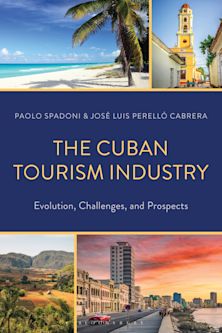Cuba's Forgotten Decade
How the 1970s Shaped the Revolution
Cuba's Forgotten Decade
How the 1970s Shaped the Revolution
Description
The 1970s have largely been overlooked in scholarly studies of the Cuban Revolution, or, at the very least, dismissed simply as a period of “Sovietization” characterized by widespread bureaucratization, institutionalization, and adherence to Soviet orthodoxy. Consequently, scant research exists that examines the major changes that took place across the decade and their role in determining the course of the Revolution. This book provides, for the first time, a comprehensive assessment of the 1970s which challenges prevailing interpretations. Drawing from multidisciplinary perspectives and exploring a range of areas—including politics, international relations, culture, education, and healthcare—its contributing authors demonstrate that the decade was a time of intense transformation which proved pivotal to the development of the Revolution. Indeed, many of the ideas, approaches, policies, and legislation developed and tested during the 1970s maintain a very visible legacy in contemporary Cuba. In highlighting the complexity of the 1970s, this volume ultimately aims to contribute to a greater understanding of the Cuban Revolution and how it chooses to face the challenges of the twenty-first century.
Table of Contents
Introduction: Cuba’s Forgotten Decade
Section One: Politics and International Relations
Chapter 1: Raúl’s Decade? Or the First Swing of the Pendulum?
Antoni Kapcia
Chapter 2: Havana and Moscow in the 1970s: “Sovietization” in an Era of Détente
Mervyn Bain
Chapter 3: David Rising: Cuba and its Northern Goliath in the 1970s
H. Michael Erisman
Chapter 4: Canada-Cuba Relations in the 1970s
John M. Kirk
Chapter 5: Militarized by Moscow? Re-examining Soviet Influence on Cuba in the 1970s
Anna Clayfield
Section Two: Healthcare and Education
Chapter 6: No Secret Cure: Why the 1970s Hold the Mystery to Cuba’s Health Paradox
Robert Huish
Chapter 7: Sexual Education in the 1970s: A Health-Based Approach
Emily J. Kirk
Chapter 8: Cuban Women and the State: Women’s Lives in the 1970s and the New Reproductive Bargain
Hope Bastian Martínez
Chapter 9: The “Three Ps” (Perfecting, Professionalization, and Pragmatism) and their Limitations for Understanding Cuban Education in the 1970s
Rosi Smith
Chapter 10: Is Class Race, and Race Class? Blacks, the Cuban Revolution, and the 1970s
Isaac Saney
Section Three: Culture
Chapter 11: Black Skin, Red Masks? Decolonization and Literature in 1970s Cuba
Par Kumaraswami
Chapter 12: Utopian Cultural Construction: Cuban Cultural Organization in the 1970s
Isabel Story
Chapter 13: Cinema and Culture in the 1970s: The Art of Autonomy
Guy Baron
Chapter 14: “Seremos (otra vez) como el Che”? Angola as an “alternative narrative” to Cuba in the 1970s
Raquel Ribeiro
Chapter 15: Within the Revolution, Everyone: Cuba, Youth, and Interrogating the 1970s Paradigm
Anne Luke
Conclusion
Index
About the Contributors
Product details
| Published | Aug 24 2018 |
|---|---|
| Format | Ebook (PDF) |
| Edition | 1st |
| Extent | 1 |
| ISBN | 9798881884543 |
| Imprint | Lexington Books |
| Series | Bloomsbury Studies on Cuba |
| Publisher | Bloomsbury Publishing |
Reviews

ONLINE RESOURCES
Bloomsbury Collections
This book is available on Bloomsbury Collections where your library has access.




















